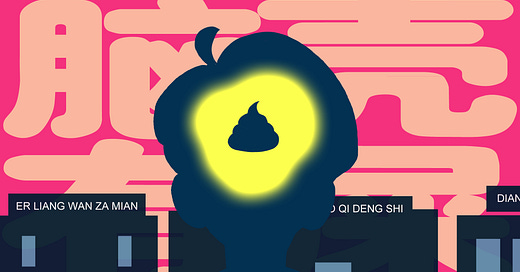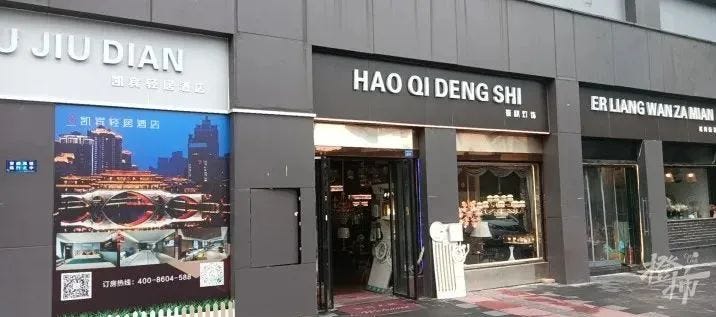Local government upsets shop owners with bad policy
Chengdu Government directive to standardise shop signs annoys shop owners and confuses customers
Welcome to RealTime Mandarin!
It’s a free weekly resource helping you learn contemporary Chinese in context, maintain and improve your Mandarin skills, and stay on top of the latest language trends in China.
Subscribe now to get the next newsletter in your inbox on Saturday.
The FISU World University Games is an international sporting event held every two years. It’s also known as Universiade - a combination of University and Olympiad.
In Chinese it’s simply called 大运会 dà yùn huì - ‘Big Sporting Event’.
The 2021 Summer World University Games were scheduled to be held in Chengdu, but it has been postponed three times due to Covid and will now be held in January, 2023.
Despite Covid set-backs, Chengdu has said it’s ready to host the event.
But one part of the preparations has pushed things a bit too far according to residents of a street in a shopping district in the city:
Last month the local government ordered business owners to change their shop signage from Chinese characters to pinyin.
The well-intentioned idea is supposed to help visiting sports fans, who don’t speak or read Chinese, to be able to read signs easier when they are in the city for the Games.
But locals aren't sure if it's going to help:
Apparently, the relevant departments of the local government want to change the signs of shops into pinyin. This is supposed to make it easier for foreigners to read them, but I’m not sure they will be able to understand?
据称是“为了迎接大运会,有关部门把我们门头字换成了拼音,说是为方便国际友人,也不晓得这些国际友人看得懂不?”
And it’s just as confusing for local customers too:
A noodles shop owner said in a video that after changing the signage on her shop, it was easily mistaken for a clothes shop or cake shop, which has had a negative effect on her business.
面馆老板在视频中称 ,改名后,她的面馆很容易被误解成“卖衣服卖蛋糕的”,影响经营
So this week we explore entertaining and colourful conversations about criticism of this over-enthusiastic policy.
Favourite Five
1. 胎神 tāi shén
idiot
我真的要吐槽一下,我不晓得是街道办哪一个胎神出的烂主意 - I really have to complain about this. I don’t know which local district administration came up with this terrible idea.
Note: this is Sichuan dialect word for ‘really stupid’. Its direct translation is ‘in the womb’ 胎 tāi, and ‘crazy’ 神经病 shén jīng bìng. In other words, so stupid you were born that way.
2. 凯撒 kǎi sà
Caesar; the powers that be, the government
让市场的归市场,凯撒归凯撒,民生的归民生 - The market, government and the people should each be to their own.
Note: Roman leader Caesar is a metaphor in Chinese for a powerful political leader, or the government. Normally used in a derogatory way.
3. 瞎子戴眼镜 xiāzi dài yǎn jìng
the blind wearing glasses; totally pointless
你们拿着国家俸禄,逼着老百姓去干些瞎子戴眼镜——多余的圈圈事 - You receive a government salary, and you force normal people to do pointless things. It’s so unnecessary.
More: 俸禄 fèng lù is a salary in a state paid job
4. 脑壳有屎 nǎo ké yǒu shǐ
shit on the brain; very stupid
成都某街改商店招牌,是权力任性呢还是脑壳进了屎 - Changing the shop signs in a Chengdu district - is this abuse of power or just really stupid?
Note: a Sichuan dialect word for having a go at someone or something.
Related: 脑子进水 nǎo zi jìn shuǐ - water on the brain (less bad than shit on the brain)
为了迎接大运会,这店招改得被百姓骂“脑子进水了” - The locals have criticised the government as having water on the brain.
5. 久旱逢甘霖 jiǔ hàn féng gān lín
a welcome rain after a drought; a refreshing change
成都某地段为迎接大运会改店招的事儿,把我看笑了,有点久旱逢甘霖的感觉 - A Chengdu street changing street signs to welcome the World University Games is hilarious. It’s exactly what I need in this otherwise monotonous life.
Note: normally used to mean something that’s welcome - a refreshing change. Here it is used ironically, and means ‘entertaining’ or a welcome break to the monotony or constant flow of bad news.
Consuming the Conversation
Useful words
洋 yáng
foreign
成都的百年品牌的名字取得土吗,得换个洋的?- Are the Chinese names of the heritage shops tacky? Should they be changed to a more western sounding name?
懵 mēng
stupid, be confused by something
有网友调侃道:外国人看不懂,中国人也懵了 - Some people commented that Chinese people cannot understand the signs, and nor can foreigners.
恼火 nǎo huǒ
annoyed and angry
连门头都不显眼,真是恼火得很!The signs aren’t even clear. It’s so frustrating!
奇葩 qí pā
ridiculous
抛开那些粗俗、鄙陋、古怪、奇葩的审美不谈,这种做法无视商家的经营自主权 - Putting aside the fact that this is vulgar, superficial, strange and ridiculous, this approach ignores the right of businesses to operate.
添堵 tiān dǔ
create problems
这样给商铺生意“添堵”,真让人无法理解难以接受 - Creating obstacles for businesses like this is really hard to understand and accept.
Note: similar to 添麻烦 tiān má fan
扼杀 è shā
to strangle
连人民网也发声说:不要让“统一招牌”扼杀城市活力 - Even the People’s Daily has said that standardising the signage is stifling the city.
笼子 lóng zi
cage; limitation or restriction
最有效的还是用法律法规将其关进笼子 - The most effective way is to manage through effective laws and regulations.
Three-character phrases
馊主意 sōu zhǔ yi
bad idea
毕竟,出馊主意改店招的人,本身就不厚道 - After all, the people that came up with this bad idea are not thinking of others.
Important: 主 here is always said in second (not third) tone in spoken Chinese.
有卵用 yǒu luǎn yòng
‘no egg use’; no use whatsoever
但在某些主事者眼里,哲学,有个卵用啊 - But in the eyes of some of the people responsible for this mess, philosophy is not important.
Note: this colloquial phrase is considered vulgar, and normally used rhetorically so say ‘what’s the point?’ A more standard (and cleaner) way to say the same thing would be 有用吗.
耍流氓 shuǎ liú máng
bad behaviour
有人说,成都改拼音是权力耍流氓 - Some people are saying that changing signs into pinyin is an abuse of government powers.
Idioms
上纲上线 shàng gāng shàng xiàn
pushing things too far
我认为这个纲上得太高了 - I think it has really gone too far.
Note: creative use of this idiom, flipping it and using 得太高了 to make the point even stronger. We discussed in this in a June newsletter this year, when I translated it as ‘treat petty issues as a matter of principle’.
琳琅满目 lín láng mǎn mù
a dazzling array
在琳琅满目的街头,你让我1秒钟就能找到要去的店不爽吗?- On such a bright and bustling street, isn’t it a great thing to be able to find where you want to go in a second?
Note: This idiom is more commonly used to describe jewellery or clothing.
整齐划一 zhěng qí huà yī
uniform
市场和审美一样,如果整齐划一,就失却了人间烟火气 - The market and taste in things are the same. If everything is the same, it will lose its charm.
Note: 烟火气 yān huǒ qì hustle and bustle, life
千人一面 qiān rén yī miàn
a thousand people one face; all looks the same
成都商铺招牌改拼音版背后:“千店一面”不只是审美问题 - Behind the changing of shops signs to pinyin in Chengdu: it’s not just an issue of them all looking the same.
Note: this is a play on words of the original idiom.
劳民伤财 láo mín shāng cái
creating work for the people and costing them money
但他们又非要装懂,以至一次次弄出劳民伤财的奇葩事 - But they also pretend like they really understand, which has lead to them making bad decisions that hurt the people.
Phrases
吃饱了撑的 chī bǎole chēng de
too much to eat and not enough to do; too much time on their hands
用到成都这家街道办头上却是妥妥的:你们,真的是吃饱了撑的!- In the context of this local administration in Chengdu, it really is a case of too much to eat and not enough to do.
Note: first discussed in 12 March newsletter this year.
Related: 让你们吃得太饱 ràng nǐmen chī de tài bǎo - We’ve given you too much to eat, in other words we’ve looked after people too well and they have become spoilt.
实在没得事干,就去洗煤炭 shí zài méi de shì gān, jiù qù xǐ méi tàn
have nothing to do so you wash coal; doing something that is pointless
四川民间有句土话,叫“实在没得事干,就去洗煤炭嘛” - As they say in Sichuan: if you have too much time on your hands go and wash some coal.
Note: washing coal in Chinese is a metaphor for doing something that’s pointless. After you’ve washed coal, it’s still the same colour.
闻过则喜,闻过则改 wén guò zé xǐ, wén guò zé gǎi
be happy to be told one’s errors and make a change
街道闻过则改。改成了这个模样 - Isn’t a change supposed to improve the street? And they’ve changed it to this?
Background: traced to the Song dynasty philosopher Lù Jiǔyuān 陆九渊 from a collection of his works. Lu is known as one of China’s most influential Neo Confucian scholars, and was alive at the same time as Zhū Xī 朱熹, a fave of Xi Jinping.
Become a member of RealTime Mandarin+
The RealTime Mandarin+ membership is a multimedia resource helping you learn contemporary Chinese in context
If you enjoyed reading the free newsletter, you’ll LOVE our paid membership: RealTime Mandarin+.
Joining Real-Time-Mandarin+, you’ll unlock loads of extra resources to help you dramatically improve your Chinese language skills.
Every week you get access to new content:
🔈Podcast - 30 min podcast every Saturday with 80% native Mandarin (including transcript)
📚 Resources and integrations - Pleco, Skritter, Hack Chinese, mylingua (new!), and PDF printouts
👩🎓 Intermediate newsfeed - One ‘real’ Chinese language news podcast and article published every Sunday, in a lesson format, pitched at an intermediate level
💬 Community - Slack community, Substack Chat, online meet-ups, in-person gatherings
🤿 Quarterly Deep Dives - One hour webinars focussing on one key challenge of intermediate learners delivered around the end of every quarter.
When you join, you’ll also have an optional 1-1 onboarding and coaching call to help orientate you.
It’s the best way to get motivated, inspired, and kick-start your Mandarin learning habit.
You can access all of these resources for less than the cost of one pint per week in a London pub.
It’s a no brainer (and much better for you)!
So, if you’ve been on the fence for a while, now is the time to confront it, invest in yourself, and commit!
Happy learning!
Andrew







